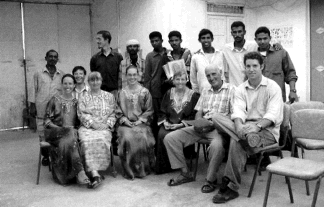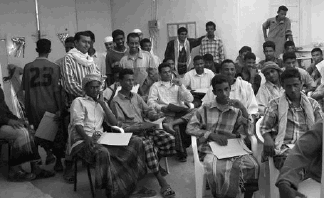
News and events
Search
Journal articles
Book reviews
About the Society
Society officers
Annual reports
Obituaries
Annual appeal
Membership
|
|
|
|
Soqotra
Training Centre
by Bill
Heber Percy
The author was founding chairman of the Society, 1993–97.
In early 2005 a party from the British-Yemeni Society which included the Hon. Secretary, Julian Paxton, the Hon. Treasurer, John Mason, and the author, visited Soqotra. Whilst there they had an opportunity to tour the Soqotra Training Centre (STC) and to meet some of the staff and students.
The STC, a charitable organisation, was started by Len and Wendy Pearce in 2000 to provide facilities for Soqotran students to learn English from Level 1 to Level 7, and to be introduced to basic computer skills and the Power Point programme. There is an enormous demand for places, and in the academic year 2004/2005 some 120 students were enrolled at the STC. Under the auspices of the British-Yemeni Society, Shan Egerton, Mary Morgan and the author launched an appeal for funds for the STC. The response was magnificent, and over £12,500 was raised. Special thanks are due to the Muhammad bin Issa (MBI) Foundation for its generous contribution. £10,000 was transferred directly to the STC to support its activities in the 2005/2006 academic year. In addition, 3 computers with their ancillary equipment were obtained, and through the efforts of David Reid were packed and air freighted to Dubai, where they were then loaded on a dhow bound for Soqotra. Miraculously they arrived safely and are already in use. The balance of the appeal is being retained to support the STC’s future activities.
 |
| |
| Staff
and students at the Training Centre |
| |
 |
| |
| ‘Certificate
Day’ at the Training Centre, May 2006 |
The present academic year, which ends in May when the monsoon wind starts to blow, has seen 115 students registered for the main English courses. 17 of these are in Levels 5 – 7, and are also studying computers. Meanwhile, at the request of the local authorities, a special class has been started to help secondary school teachers on the island improve their English teaching skills, and another class for hotel workers, immigration and customs officers and airport personnel. Thus the staff at the STC have been very fully occupied. Despite this, they have been able to raise specific funds to assist some fishermen on the island replace equipment destroyed in the Tsunami disaster, and to help a bedouin community construct a primary school.
The STC has now completed five years of English language teaching and four years of computer instruction. Over 400 certificates have been issued to students who have completed between 1 and 5 years of study. Of those who have completed their studies, 15 now have jobs in the tourist industry as guides and translators. Two have gone to university in Saudi Arabia on scholarships, and two others have gone to mainland Yemen to continue their studies there.
In a recent letter the director says, ‘I am delighted to learn that the balance of the Appeal, £2,800, will be available to the STC for the start of the next academic year in September. It will be of great assistance to us. Will you please thank the donors on behalf of myself, the other members of staff and the students. Whilst the STC remains the flagship of our work on the island, we would like to launch out and start two or three other projects in areas where, with the knowledge we have built up over the last five years, we see huge needs. One is for a locally developed and manufactured hand pump for wells. An engineering friend built one in an afternoon and it now works as a demonstration model on our own well. We would like to train two Soqotrans to build and retail these pumps. They can be built for about $40 using materials already available in Soqotra. They are easy to operate and can produce a litre per stroke from a depth of 9 metres. Another project is a locally produced (it is already being manufactured in the Mahra area on the mainland) solar desalinisation plant, also using local materials, and producing 6 litres of fresh water per day from brackish or dirty water. We would also like to start a small nursery for citrus trees. We believe that none of this will distract us from our paramount work in the STC’.
All these proposed projects seem eminently practical, and valuable to the Soqotran community. During our visit we came across evidence of the brackishness of many of the coastal water supplies, and noticed the lack of locally produced fruit and vegetables. The establishment of a nursery citrus garden would seem to be particularly worthy of support.
As a visitor to the island for only a couple of weeks, it ill behoves me to comment, but in comparison to some high profile projects financed by international development agencies of various hues and acronyms, and relatively bottomless pockets, the STC is doing work of considerable importance on a mere shoe string. For example, we admired a stretch of dual carriageway recently built around Hadibu (the capital), which must have cost millions to construct but would seem under-used even if every vehicle across the island were on it at the same time. Interestingly, a stretch of this carriageway was washed away by a flood soon after completion. The total budget for the STC for 2004/2005 was $49,000. With 120 students in the school this equates to about $400 per student – remarkable value for money. Funding remains a considerable problem. Whilst it is possible, if not easy, to raise funds for a specific project, to keep on raising money for an open-ended project like the STC, where the bulk of costs are recurrent, is much more difficult even though it may be of greater value to the future of Soqotra and the Soqotrans.
Vol
14. 2006
|
|
